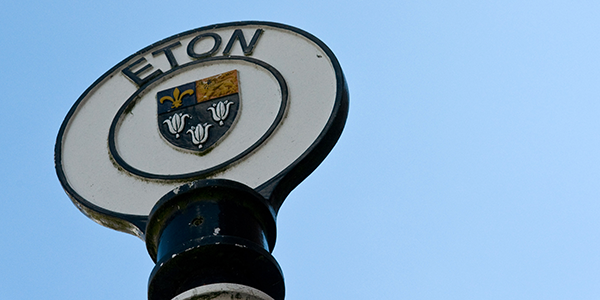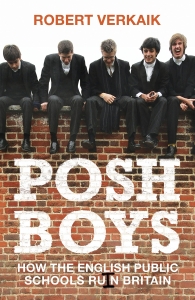Book Review | Posh Boys: How the English Public Schools Ruin Britain by Robert Verkaik
In Posh Boys: How the English Public Schools Ruin Britain, Robert Verkaik explores the role that public schooling plays in reproducing inequality in Britain, showing how public schools enable wealthy families to pass down their privilege to their children who subsequently have greater access to the most lucrative and powerful areas of British society. Grounded in statistical evidence, this is a valuable contribution to debates surrounding social mobility in the UK, writes Ross Goldstone.

Eton, Berkshire. Picture: Josh Hallett/(CC BY SA 2.0) licence
Posh Boys: How the English Public Schools Ruin Britain. Robert Verkaik. Oneworld. 2018.

The publication of Posh Boys: How the English Public Schools Ruin Britain comes at a time of growing social and economic inequality, where the foundations of British society are being fundamentally questioned. A key way through which this inequality is reproduced is education, with public schooling providing a glaring case-in-point. Here, public schooling is defined as fee-paying schools operating independently from the state system of education. As Robert Verkaik articulates in his book, these schools allow the wealthy to pass down their privilege, enabling children from very privileged backgrounds to subsequently access the most lucrative and powerful areas of British society. They are then able to use these instruments of power to exacerbate their privilege. Verkaik effectively portrays this process in his book.
Posh Boys is foregrounded by an appreciation of the statistical evidence on the current state of public-school privilege today. Approximately 7% of children are privately educated, but more than 40% of the 500 most powerful people in the UK were privately educated (289), including 74% of UK senior judges, 74% of senior officers in the British Armed Forces, 55% of permanent secretaries in Whitehall, 50% of government Cabinet ministers and members of the House of Lords and a third of Russell Group university vice-chancellors (4). Thus, power is concentrated disproportionately amongst and in favour of those from a privately educated background.
It is in this context that Verkaik delivers his critical exploration of English public schools and how, through their unrelenting success in securing advantages for their alumni, they have fundamentally contributed to many of the problems confronting contemporary British society. In this provocative book, Verkaik shows how the deeply embedded networks linking the highest echelons of British society with public schools, and specifically a small group of ‘elite’ public schools, has been and is preserved. This is done firstly by charting the development of English public schools from genuine charity to prep schools for the ruling class, and thereafter articulating how the education provided in such schools has fundamentally damaged, and continues to ruin, British society.
Though the book is far-reaching and touches upon a number of topics, including Brexit and child abuse scandals, in this review I will focus on two key arguments that run throughout the book. These are: (1) how the public-school sector in Britain has been politically protected, preventing reform; and (2) how social capital is central to both entry into and the outcomes of public schooling.
After introducing the origins of public schools as providers of education to ‘the community’s poorest and most needy children’ (16), Verkaik documents how these schools quickly turned into ‘Nurseries of Aristocracy’ (25), wherein fees sky-rocketed so that only those with high levels of disposable income could even consider applying. This meant that by the fifteenth century, fee-paying scholars outnumbered free scholars. Fast-forward to today: public schools still maintain their oxymoronic name but are composed of very few, if any, genuinely disadvantaged students (232–33). Instead, only 1% of all Independent Schools Council (ISC) pupils are free scholars, and many of these are questionably from socially disadvantaged backgrounds (224). Even if they are, as one public school headmaster stated: ‘You do not deal with a famine by sending a few lucky children to lunch at the Ritz’ (101).
Now, in normal circumstances, such a system of engrained privilege and inequality in access would not be sustainable in a modern democracy self-described as a ‘meritocracy’. This is particularly the case when repeated financial and academic scandals, alongside the questionable origin of fees paid, are considered. Throughout the book, Verkaik reveals how the independent, fee-paying school sector has been able to operate largely unchecked. This lack of reform is despite its modern manifestation as ‘bastions of privilege’ and exclusivity (192). The reason for the lack of government action, for Verkaik, is due to the vested interests of those tasked at reforming the public-school system, most particularly the fact that these very politicians are typically beneficiaries of that very system and/or choose to enter their children into it. Thus, a conflict of interest emerges at the heart of the policy process.
A range of evidence is given to support this claim, such as the fact that every elected prime minister since 1806, excluding Edward Heath, has had ties to the system, either through their own education or that of their family (287). Verkaik also alludes to the current political landscape being dominated by public school students, where even an opposition with socialist ideals is fronted by public schoolboys and fails to go beyond discussing the tax status of public schools. But the most effective illustrations given are how those very individuals tasked with reforming the sector were products of it. For instance, Anthony Crosland, who was oversaw the reform of public schooling in the 1960s, was privately educated himself. What Verkaik highlights is a system governed by a disproportionate number of privately educated politicians, and importantly leaders, who then fail to fundamentally change the very system that propelled them into their privileged position.
Now, not everybody can access this exclusive system (192), especially the ‘magic circle of top schools’ (191). Verkaik unearths for the reader how a greater number of those attending these schools do so through the mobilisation of familial networks. This can manifest via the names of newly born children being put on the ‘Eton list’ (190), calling upon government ministers to position a child’s admission as in the ‘national interest’ (199) or simply possessing the tacit understanding of the system to maximise opportunity for one’s child. Though it isn’t just in admissions where the role of social networks is illustrated. Verkaik shows how parents pay for much more than an education. Part of the service is granting entry into Oxbridge, which disproportionately recruits from fee-paying schools. In addition, ‘public schools breed networks’ (290), giving an already privileged child additional advantages and resources they can cash-in on later. It is this self-serving nature of public schools, putting school and fellow student above everything else, including nation, which Verkaik attributes to the decaying of public trust and the ‘ruining’ of British society.
However, one cautionary note is that there seems to be insufficient differentiation between the ‘top’ public schools and those less prestigious ones. Whilst they all likely enjoy advantages over most state schools, Verkaik tends to overlook how much of his evidence demonstrates how a small number of ISC schools dominate British society.
Posh Boys presents a valuable non-academic contribution to debates surrounding social mobility in Britain. It can be understood in relation to other recent publications discussing education and social (im-)mobility, including Miseducation by Diane Reay, The Class Ceilingby Sam Friedman and Daniel Laurison and Engines of Privilege by David Kynaston and Francis Green. Posh Boys will have an appeal for academics, policymakers, educationalists and those interested in making Britain a more equitable country. It also has international resonance, given the recent trend of exporting British public-school provision around the world. It was only by reading this book that I truly understood the deeply engrained nature of the ‘privilege’ that is public schooling. With the two recent governments remaining dominated by the privately educated, Her Majesty’s opposition increasing its proportion of privately educated representatives (185) and the increasing global demand for a British public-school education, this book is ever so timely.
This review gives the views of the author, and not the position of Democratic Audit. It was first published on the LSE Review of Books blog.
Ross Goldstone is an ESRC-funded PhD candidate at the School of Social Sciences, Cardiff University, where he is studying the relationship between social class and further education participation and experience. His current interests are in educational inequality and the sociology of education, in addition to wider debates around social class, and the ideas of Pierre Bourdieu and their application in educational research. He tweets at @GoldstoneRoss.





 Democratic Audit's core funding is provided by the Joseph Rowntree Charitable Trust. Additional funding is provided by the London School of Economics.
Democratic Audit's core funding is provided by the Joseph Rowntree Charitable Trust. Additional funding is provided by the London School of Economics.